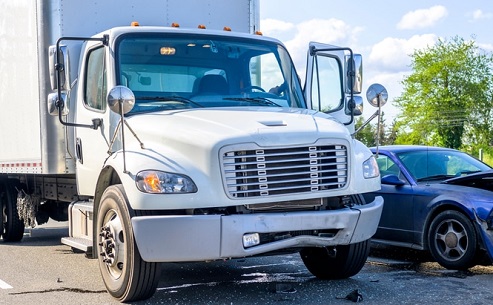Common Causes of Commercial Truck Accidents in Texas
Any traffic collision can injure vehicle occupants, but accidents involving tractor-trailers and other heavy commercial trucks are more likely to result in catastrophic injury or fatal injury. Texas has the highest number of fatal truck crashes of any state.
If you have been injured in a Texas truck accident, you may be dealing with painful injuries, being unable to work, and facing mounting financial bills and stress.
If a commercial truck driver or someone else was at fault in the accident, you might be entitled to seek compensation to cover the cost of your medical bills and other damages. You’ve come to the right place for help.
Common Causes of Truck Accidents Commercial Truck and Car Accidents
Large trucks are involved in a disproportionate share of serious and fatal accidents. According to the National Safety Council (NSC), in 2019, large trucks accounted for 4 percent of registered vehicles in the US but comprised 10 percent of all vehicles involved in fatal crashes.
Houston Maritime Injury Lawyer
Texas reported more than 650 deaths in accidents involving large trucks in one recent year. Most of the dead were occupants of small vehicles that collided with larger trucks.
A large-scale study by the Federal Motor Carrier Safety Administration (FMCSA) and the National Highway Traffic Safety Administration (NHTSA) evaluated the common causes of truck accidents.
Researchers analyzed thousands of large truck accidents over several years to identify factors associated with truck accidents.
Contributing factors include:
Aggressive Driving: Aggressive driving includes speeding, weaving lanes, tailgating, disobeying traffic signals, and cutting others off in traffic.
Drivers may behave aggressively when stuck in traffic, frustrated by other drivers, or under pressure to meet tight delivery deadlines.
According to the FMCSA study, traveling too fast for conditions contributed to 23 percent of large truck crashes.
Distracted Driving: Researchers identified driver inattention as contributing to 9 percent of truck crashes.
Driving a large commercial truck requires concentration and awareness of the surrounding traffic.
Truckers put themselves and everyone else on the road at significant risk when they are inattentive or allow distractions to distract them from the road. Common distractions include using a cell phone, text messaging, eating, and a navigation system.
Driver Fatigue: Commercial truck drivers spend many hours each week driving. Over time, irregular schedules and lack of adequate sleep can lead to extreme fatigue.
The federal government limits the number of hours truckers can drive each day and each week to keep tired truckers off the road.
But many motorists violate this limit. Fatigue can cause impairments similar to the effects of alcohol. Drowsy truck drivers are a danger to everyone on the road.
Unreasonable Work Demands: Some unscrupulous trucking companies offer unfair schedules or financial incentives to their drivers to encourage them to overlook hours of service.
This causes a large number of truck accidents. Ten percent of reported large truck accidents involved drivers who said they felt pressured by their carriers.
Improperly Loaded Cargo: Large trucks carry tons of cargo. The load needs to be balanced and tied properly.
If cargo loaders overload trailers or fail to properly secure cargo, the shipment may shift in transit and cause an accident. Unsecured cargo contributed to about 4 percent of the accidents the researchers studied.
Employer’s Negligence: Even the most careful truck driver can be involved in an accident due to an employer’s negligence.
Many drivers do not own or operate their trucks. They depend on trucking companies for their routes and maintenance of the vehicles they drive.
If an employer fails to properly screen or train its drivers, the trucking company may be liable for accidents caused by unsafe trucks or unqualified drivers.
Poor road conditions: Limited visibility, obstructions, and poor road infrastructure can make it difficult for truckers to drive safely.
According to an FMCSA study, 22 percent of large truck crashes involve drivers unfamiliar with the road, and 20 percent involve other road problems.
If the truck driver fails to reduce speed appropriately when road conditions require it, the driver may not have enough time to avoid an accident.
Lack of Maintenance: Commercial trucks have thousands of moving parts that experience wear and tear.
Trucks require regular maintenance to remain safe to drive. Inadequate inspection or deferred maintenance by truck drivers, trucking companies, or mechanics can contribute to component failure and accidents.
Brake problems were the most common mechanical problem, accounting for 29 percent of the crashes studied. Tire problems were also common.
Driving Errors: When truck drivers make recognition, judgment, or performance errors, even a small mistake can have serious consequences.
Any error on the truck driver’s part can lead to disastrous accidents and serious injuries. About 14 percent of reported large truck crashes involved inadequate monitoring, 9 percent involved illegal maneuvers, and 5 percent involved truck drivers following other vehicles too closely.
Drunk driving: Alcohol contributes to a relatively small number of major truck accidents. Commercial truck drivers know that if convicted of driving under the influence, they will lose their commercial licenses and livelihoods.
Still, some truckers succumb to alcoholism due to boredom or isolation on the road. If drivers drive after drinking alcohol, they can be dangerously affected due to decreased visual perception and motor control.
Drunk Driving: The use of prescription and over-the-counter drugs is far more prevalent and difficult to detect than alcohol use among truck drivers.
Many truck drivers use allergy medications and other over-the-counter medications. OTC drugs were a contributor to 17 percent of truck accidents. Illicit drug use was a factor in about 2 percent of major truck accidents.
The side effects of illegal and OTC drugs can vary widely, making drug truckers unpredictable and dangerous.
Lack of Experience: The US trucking industry has been experiencing a widespread shortage of truck drivers for at least 15 years.
As a result, many carriers have been forced to rely on inexperienced drivers to meet demand. Truck drivers cannot drive commercial vehicles without a proper license.
But simply having a commercial driver’s license (CDL) does not equate to years of practical experience. Inexperienced truck drivers are more likely to fail to recognize dangerous situations and make driving errors that lead to serious accidents.
Inadequate driver training: If a commercial truck driver is hired or allowed to drive without proper training, his employer may be liable for damages caused by any resulting wreck.
Faulty components: Commercial truck components such as brakes can sometimes become faulty and cause accidents.
If the manufacturer of a critical truck part produces a defective component during production, the component may fail, and control may be lost.
When component failure contributes to a truck accident, injured victims may have grounds to file a claim against the negligent manufacturers.

